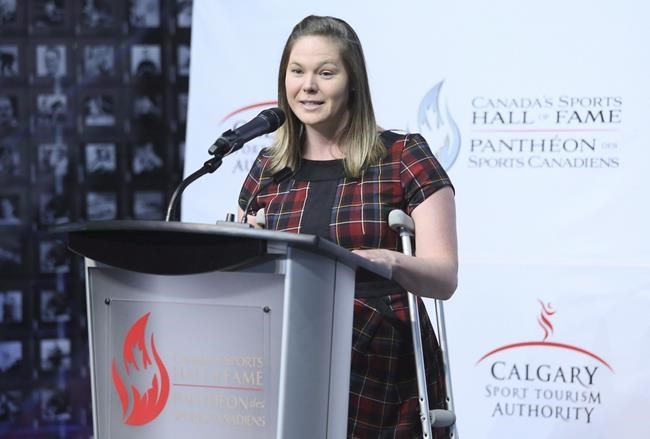Stephanie Dixon had a simple message to Canada's Paralympic athletes one year out from the Tokyo Games: You've got this.
Like the Olympics, the Paralympics were pushed back a year due to COVID-19, and the opening ceremonies are now scheduled for Aug. 24, 2021 in Tokyo.
Dixon is chef de mission of the Canadian team, and delivered a video message of hope on Monday.
"Athletes, especially Paralympic athletes, are no strangers to adversity, their whole life has been surrounded by adversity and a Paralympian has succeeded because of their ability to deal with and thrive in the face of adversity," Dixon said.
"The message I really want to get out to our Paralympians is: Yes, be gentle with yourself. Any emotion you're feeling is OK. You're supported. But also, you've got this, you have dealt with adversity your entire life. You have the tools and support. Have faith and believe in yourself."
It's not a given that the 2021 Paralympics will happen with COVID-19 throwing the global sports world into a state of flux. If they do, they'll be the biggest in history, drawing close to 4,500 athletes in 22 sports.
The Canadian team hopes to improve on the 29 medals, including eight gold, captured in Rio four years ago. The squad is expected to be led by wheelchair racer Brent Lakatos, distance runner Nate Riech, and swimmer Aurelie Rivard, among others.
Riech, who will make his Paralympic debut in Tokyo, is the world record-holder in the 800 and 1,500 metres. Riech was hit in the back of the head by a line drive from 150 yards out while golfing at age 10. He was left with a brain injury that affected the right side of his body.
The 25-year-old said when the Paralympics were postponed in March, his immediate response was sadness.
"Last year was the best I'd ever had and I was really on a roll and I really thought I had a chance to win in Tokyo," Riech said.
But he quickly switched gears.
"I started asking the question: What's next? What do I need to do to be ready when that time comes?"
Riech said the layoff has been a small blessing in disguise. Because of his brain injury and his body's imbalance, he gets injured easily. But without the physical toll of racing this season, he and Victoria-based coach Heather Hennigar have been able to slowly increase his weekly mileage, from 50 to 60 kilometres per week up to close to 100.
He recently posted a seven-second personal best time in the 3,000 metres in a time trial, running alone.
Dixon, one of the world's most successful Paralympians in swimming, stopped short of calling the forced layoff a "blessing, because I feel like that's a little bit too far in a circumstance this heavy."
But the layoff provides opportunities, she said, for athletes to give their bodies and minds a break.
"For athletes having a chance to reflect and recover and then also because it's quite extreme what athletes put their bodies through. . . having a period of time where things are put on a forced pause, there is healing and recovery and reflection and so I hope a lot of athletes are taking those opportunities to do that," she said.
The 36-year-old Dixon, who was born without a right leg and hip, won 17 Paralympic medals in the pool, including seven golds. She never had a forced layoff like Canada's current Paralympians, but likened the emotions to the post-Paralympic depression she felt after the 2004 Athens Games.
"I was just really, really struggling . . . feeling unmotivated, isolated, confused, sadness, lethargy," she said. "And so obviously, very different context, but when you don't feel in control, for our athletes to not only have a huge change in their physical training regimen, but also imagine that roller-coaster of emotion and feeling unmotivated and not very passionate, I can relate.
"It's just so hard and confusing when so much of our identity is wrapped up in that motivated, passionate athlete."
The Tokyo Olympic organizing committee has acknowledged that holding the Games without fans, in bubbles similar to what the NBA and NHL are using to complete their seasons, is a possibility, particularly if there is no vaccine for COVID-19.
Riech — whose dad Todd competed in javelin for the U.S. at the 1996 Olympics and mom Ardin Tucker was a Canadian pole vaulter who competed at the 2002 Commonwealth Games — said he just wants to race, no matter how many people are watching.
"I obviously would love to have my family and friends and fans there," he said. "But I don't need them to get hyped up . . . Seeing my dad go to the Olympics, and my mom won the (Canadian championships), the Olympics are something that I've always dreamed of. And, after I got hurt that opportunity would not necessarily have been there."
So he's willing to wait.
Dixon said Canadian athletes might came away from this setback stronger than ever.
"All of our athletes have the tools that they need to not only get through this, but to come out on the other side stronger," she said. "And that really is my main message to our athletes."
This report by The Canadian Press was first published Aug. 24, 2020.
Lori Ewing, The Canadian Press




